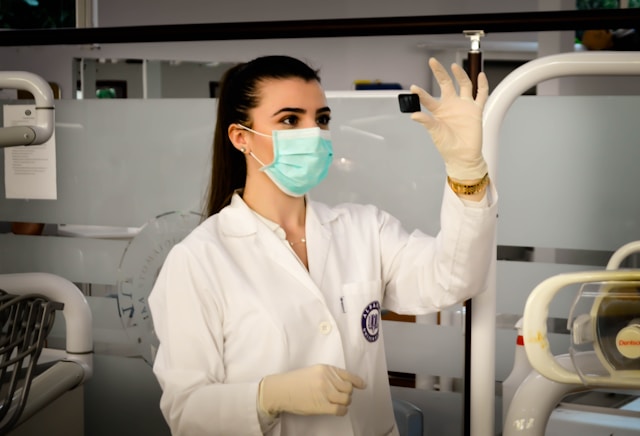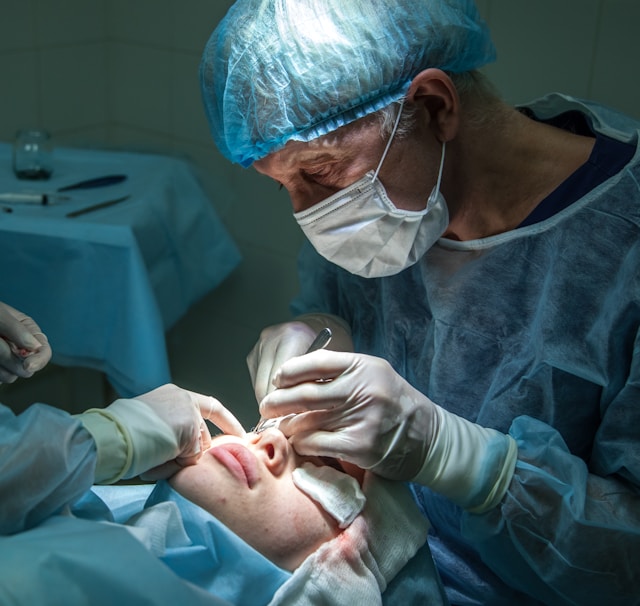Cataract surgery is one of the most common and successful surgeries performed to restore blurred vision by removing the natural lens from the eye and replacing it with IOLs ( clear and artificial lenses). 95% of the patients have a successful outcome post-cataract surgery. However, in a few cases, some patients may encounter significant complications, such as double vision.
Double vision after cataract surgery is a serious complication that can hamper daily activities if left untreated. Understanding the root cause and solutions for double vision is important for patients’ smooth recovery and treatment. In today’s health guide, we will explore seven key causes of double vision and their solutions after cataract surgery.
Understanding Double Vision
What is Double Vision?
Double vision, or diplopia, is an eye condition where a person starts seeing two images of a single object. These double images can appear side by side, or one on top of the other or even at different angles. Diplopia or double vision can affect a single eye or even both eyes. If double vision is affected single eye it is called monocular diplopia and if it is affecting both eyes it’s known as binocular diplopia.
Double vision after cataract surgery can be an alarming condition, and if you experience the same, then you should notify your Ophthalmologist for treatment.
Why Does Double Vision Occur After Cataract Surgery?
Double vision after cataract surgery can be caused by various reasons such as residual refractive errors, lens misalignment, dry eyes, eye muscle imbalances, posterior capsule opacification (PCO), issues with the intraocular lens (IOL), or may be due to any existing underlying condition. To treat double vision effectively, identifying the root cause is essential to start appropriate treatment and get optimal vision results.
Top 7 Causes of Double Vision After Cataract Surgery
1. Residual Refractive Errors
Residual refractive errors is a condition when the eye prescription is not fully corrected post cataract surgery. This could be due to the IOL implanted during cataract surgery does not perfectly match the eye refractive needs, and can lead to blurred or double vision. During this condition, the patient may not be able to focus finely on any object or see multiple images of a single object.
The most effective way to treat residual refractive error is to upgrade your existing eyeglasses or contact lens prescription. Get your eye examination done by the ophthalmologist to determine the correct prescription for improving visual clarity. Although rare in a few cases, refractive surgery might be needed to fine-tune the vision.
2. Lens Misalignment
During cataract surgery, lens misalignment can happen when the artificial lens(IOL) is not perfectly centered within the eye. Due to lens misalignment visual distortions can happen including double vision. During surgical procedures, lens shifting position or improper alignment of the lens can lead to double vision.
Once the lens misalignment is identified, repositioning of IOL is necessary to treat the condition i.e double vision after cataract surgery issue. Repositioning of the lens will be done by your Ophthalmologist, the process will involve carefully adjusting the lens to the correct position. You may need to undergo secondary surgery to achieve the correct alignment.
3. Dry Eyes
Dry eye is a condition when there is a lack of sufficient moisture on the eye surface which affects how images are focused. Long-term dryness in the eyes can cause irregularity in the cornea which results in blurred or double vision. Dry eye is a common condition after cataract surgery during the postoperative period as the eye recovers from surgery.
Using lubricating eye drops or artificial tears is an effective treatment for dry eyes to maintain moisture on the eye surface. Also, avoid an environment that exacerbates dryness such as high windy areas or air conditioning, and apply warm compresses on the eye for temporary relief. Consult your ophthalmologist for advanced treatment and medications. Treating dry eyes is an effective way to solve double vision after cataract surgery.
4. Eye Muscle Imbalance
When the muscles controlling eye movement do not work together in synchronization it results in eye muscle imbalance, or strabismus. Due to this misalignment eyes are unable to focus and result in double vision. Due to changes in eye alignment after cataract surgery strabismus can develop easily and becomes more noticeable.
Vision therapy can help in treating eye muscle imbalances, and training your eyes after cataract surgery to work together more effectively. Vision therapy involves a series of exercises designed to improve your eye coordination and alignment. In case vision therapy is not effective then surgical intervention will be required to correct the muscle imbalance.
5. Posterior Capsule Opacification (PCO)
PCO (Posterior Capsule Opacification) is a very common complication after cataract surgery which can develop after weeks, months, or even years. In PCO the capsule holding the IOL(artificial lens) becomes cloudy which can lead to obstructed vision and double vision.
The most effective way to treat PCO is YAG laser capsulotomy. In this process, a laser is used to create an opening in the cloudy capsule which helps in restoring clear vision.
6. Intraocular Lens (IOL) Issues
With the implantation of IOL, there is also the possibility of issues with IOL such as incorrect lens power, dislocation, or damage during the cataract surgery. These issues can cause visual disturbance and affect how light is focused on the retina which can cause blurred or double vision.

To fix the IOL issues, your ophthalmologist first needs to identify if the problems are due to IOL. Once identified, the next step is to decide on the replacement of the lens or adjustment to the existing lens to correct visual issues.
7. Other Health Conditions
Certain health conditions can also contribute to double vision. People who have conditions like diabetes, thyroid, or neurological issues are more likely to get affected by double vision after cataracts. Under these conditions muscles and nerves responsible for eye movement and alignment get affected which can potentially lead to double vision.
If double vision is caused due to underlying health conditions, then it is necessary to manage primary health conditions such as diabetes, thyroid, etc. Schedule an appointment with your physician and work on controlling health issues. Management of primary health conditions will help in improving overall visual functions and will alleviate double vision symptoms.
Top 7 Solutions for Double Vision After Cataract Surgery
1. Use of Corrective Glasses or Contact Lenses
Use of corrective glasses or contact lenses is the first step to managing the double vision after cataract surgery. Corrective glasses or contact lenses help in improving clarity and also address residual refractive errors.
To choose the correct glasses or contact lenses, consult your Ophthalmologist to determine best prescription for your eye needs. If you have any refractive error then an eye exam will help in identifying the same.
2. Refractive Surgery Adjustments
If refractive errors do not resolve even after using corrective glasses or contact lenses, then refractive surgery may be prescribed by your eye surgeon. Refractive surgery will help with vision correction and also address if any other vision issues.
Your eye surgeon can opt for LASIK, PRK, or any other refractive surgery for your specific needs. It is important to discuss the refractive surgery type and your situation with your ophthalmologist.
3. Treating Dry Eyes
Management of dry eyes can be done by using certain lubricating eye drops, applying a warm compress around your eyes, and avoiding going to places that dry your eyes. If there is excessive dryness in eyes, then your Ophthalmologist may prescribe medications and procedures to improve tear production.
Several habits if incorporated into your daily lifestyle then you can get rid of your dry eyes, like drinking plenty of water to keep your body hydrated, limiting screen time, taking regular breaks during long office hours, using a humidifier and exercising. Do regular follow-ups with your eye doctor (Ophthalmologist ) for monitoring the eye conditions and addressing any dry eye symptoms.
4. Vision Therapy
Vision therapies help improve eye coordination and alignment. They help in addressing eye muscle imbalance and reduce double vision. Vision therapy involves a set of exercises and activities specially designed by a vision therapist or Ophthalmologist according to vision needs.
Your Ophthalmologist will create a customized vision therapy plan to improve your double vision and other visual issues.
5. YAG Laser Capsulotomy
YAG Laser Capsulotomy is a laser process used to clear a cloudy capsule caused by PCO ( Posterior Capsule Opacification ). The process typically takes a few minutes to half an hour and post YAG laser capsulotomy patients may experience temporary blurriness, however, vision starts improving from a few hours to days. For a smooth and fast recovery, it is essential to follow your Ophthalmologist’s instructions.
6. Lens Replacement or Adjustment
If double vision or any other vision disturbance is identified due to existing IOL, then your Ophthalmologist will opt for lens replacement or will make adjustments to it according to requirement. Your Ophthalmologist needs to perform a thorough examination of your eyes and IOL. Once the issue is identified, your eye surgeon will discuss the best possible ways to resolve the vision issues.
The final decision on lens replacement or adjustment will depend upon the issues with IOL if they can be mitigated in the current lens or new lens is required. Also, your overall eye health plays an important role in deciding the lens adjustment and replacement.

7. Medical Treatment for Underlying Conditions
It is essential to manage underlying medical conditions such as being overweight, diabetes, thyroid disorders, or other health issues to alleviate double vision caused by them. Work closely with your physician or health care specialist for regular monitoring and treatment.
Treating and managing your health condition is necessary to improve your vision and your overall health. Next, we will see preventive methods for double vision after cataract surgery.
5 Key Preventive Measures and Tips for Managing Double Vision After Cataract Surgery
1. Pre-surgery Considerations
It is important to undergo a comprehensive eye examination to identify potential vision issues and overall eye health before cataract surgery. These test results help in addressing pre-existing eye conditions and reduce the risk of complications after cataract surgery.
Discuss your eye test results, surgical process, choosing the IOL type for your eyes and most importantly discuss the outcomes of your cataract surgery and potential risk. This will help you to have realistic expectations and will help you to get prepared for post-cataract surgery.
2. Post-Surgery Care
Post-surgery care is very important after cataract surgery. It is important to adhere to your Ophthalmologist’s post-operative instructions for a smooth and fast recovery and to avoid complications like double vision.
a. Always use prescribed eye drops to prevent eye infection and inflammation.
b. Do not engage yourself in any strenuous activities because it can stress your healing eyes.
c. Monitor your eye’s recovery and do regular follow-ups with your Ophthalmologist to check lens alignment and proper healing. Regular follow-ups help your eye surgeon to evaluate your eye condition and modify the treatment plans accordingly. There are a few foods you should avoid eating after cataract surgery for some time for faster recovery like spicy food, alcohol, etc. Read Top 10 Foods not to eat after cataract surgery
3. Allow Time for Visual Adjustment
Remember it takes a few days to weeks to adjust your eyes to the new IOL. It is important to give your eyes time for visual adjustment before making any changes to your eyewear prescription. Wait till your vision is fully stabilized before altering your eyeglasses or contact lenses.
4. Manage Dry Eye Symptoms
As stated before, dry eye is a common issue after cataract surgery, and it can worsen double vision by causing blurred vision or fluctuating vision. Treatment for dry eyes includes using lubricating eye drops prescribed by your eye surgeon, using a humidifier to protect your surroundings from being dry and avoiding environmental irritants such as smoke and wind.
5. Regular Eye Exercises
Engaging yourself in regular eye exercise can be beneficial for treating double vision. Eye exercise helps improve the coordination of eye muscles and reduce symptoms. It is important to train your eyes after cataract surgery for smooth recovery.
Conclusion
Double vision after cataract surgery can be very distressing but can be easily managed by following the preventive measures and solutions shared above. It is necessary to do regular follow-ups with your Ophthalmologist and follow their recommendations for the best results. By following all the steps shared in this blog you will be on your way to a clear vision and smooth recovery.
1. What causes double vision after cataract surgery?
Double vision can be caused by several factors such as lens misalignment, dry eyes, eye muscle imbalance, residual refractive errors, posterior capsule opacification (PCO), intraocular lens (IOL) issues, or any other underlying health conditions.
2. How can residual refractive errors contribute to double vision?
Residual refractive errors occur when the eye vision is not corrected even after performing cataract surgery. Due to refractive errors images appear to be doubled or blurred. In a few cases, adjusting your eyeglasses or contact lenses prescription helps in resolving the issues.
3. What is lens misalignment and how does it affect vision?
Lens misalignment is a condition when IOL is not perfectly centred during cataract surgery. Due to lens misalignment, it can lead to distorted or double-vision. Lens misalignment can be treated by repositioning the lens or by performing additional surgery to correct the alignment
4. Can dry eyes cause double vision after cataract surgery?
Yes, dry eyes can cause double vision after cataract surgery. Due to dry eyes, there is always a shortage of moisture on the eye surface which in turn affects the clarity of the image. To prevent dry eye stay always hydrated by drinking plenty of water every day and using artificial tears to keep eyes in hydrated condition.
5. What role do eye muscle imbalances play in double vision?
Due to eye muscle imbalance, muscles controlling eye movement do not function properly due to which eyes are not able to focus correctly which often results in double vision. Eye muscle imbalance is corrected by adopting vision therapy or surgery may be required in a few cases.
Reviewed By
Dr. Sonam Aggarwal
MBBS, MD(C.Medicine)

[…] the causes of double vision after cataract surgery and learn how to resolve it with expert-recommended treatments. Achieve clearer vision […]